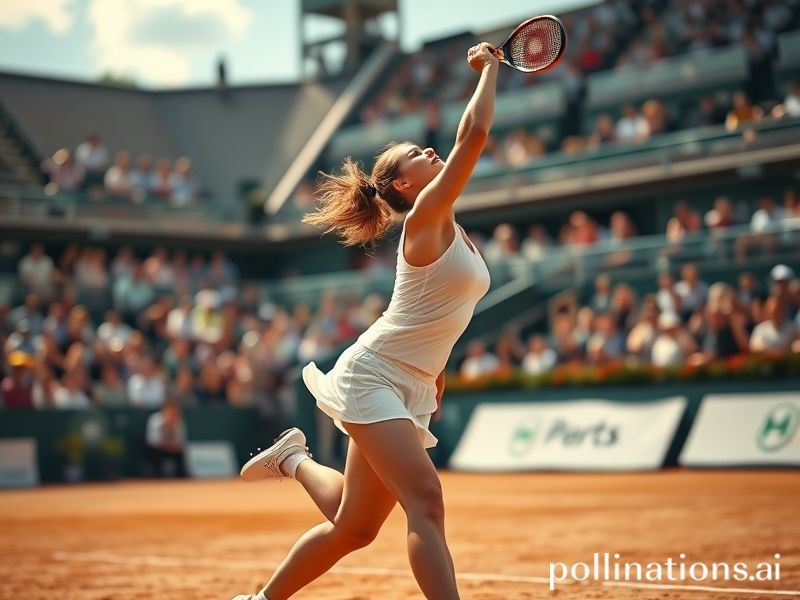Kazakhstan’s Kamilla Rakhimova: Tennis Prodigy, Soft-Power Prop, and Accidental Geopolitical Rorschach Test
The World According to Kamilla Rakhimova, or How to Be 22 and Already a Geopolitical Pawn
By Our Correspondent in Everywhere and Nowhere
PARIS—In the grand casino that is the WTA Tour, Kamilla Rakhimova has quietly become the house’s favorite underdog: a 22-year-old Kazakh with a baseline game as steady as a Swiss bank clerk and a ranking trajectory that looks suspiciously like a crypto pump-and-dump, minus the environmental guilt. To the casual observer she is merely another Eastern Bloc surname on the drawsheet, pronounced correctly only by the chair umpire and her immediate family. To the geopolitical soothsayers, however, she is a walking Rorschach test in Nike swooshes: proof that soft power now comes strung at 55 pounds tension and wrapped in Tourna Grip.
Consider the optics. Born in Almaty when Kazakhstan was still best known for Borat and potassium exports, Rakhimova has spent her formative years ricocheting between clay courts in Morocco and indoor hardcourts in Nur-Sultan—venues that sound like they were invented by a bored Risk player. Each victory abroad is immediately repackaged by state media as evidence that the New Kazakhstan™ can compete with the old tennis superpowers without having to annex anyone’s Crimea. Meanwhile, Russian propaganda networks insist she’s “spiritually” one of theirs, because apparently nothing says sovereignty like a neighbor claiming your second serve.
The West, ever eager for a narrative, casts her as the plucky escapee from authoritarian shadows. Never mind that her Instagram features more avocado toast than Borat quotes, or that she trains in Dubai—where oligarchs and influencers alike go to forget what season it is. We like our freedom fighters photogenic and preferably holding a Wilson Blade; bonus points if they can volley. Rakhimova obliges, smiling just enough to keep endorsement managers employed, not enough to suggest she’s read the fine print.
On court, the numbers are almost refreshingly apolitical: 155 aces this season, 47 double faults, a 58 percent win rate on return games—statistics that would bore a spreadsheet. Off court, each metric is weaponized by whichever ministry needs a morale boost. The Kazakh Tennis Federation trumpets her rise as proof that national investment in sports academies beats investing in, say, transparent elections. Russian commentators comb her interviews for any vowel that sounds Slavic enough to justify a cultural victory. And somewhere in a glass tower in Lausanne, a WTA executive calculates how many new streaming subscriptions a deep Kazakh run at Roland-Garros would unlock in Southeast Asia.
The players themselves are less delusional, which is saying something for a cohort that travels with entourages large enough to staff a small embassy. In the locker room they speak a universal dialect of mild despair: delayed flights, dead string jobs, the existential dread of realizing your ranking peaked during a pandemic no one trained for. Rakhimova fits right in, nodding along to tales of quarantine hotel food that could strip paint. She is, after all, only 22—an age when most of us were still incapable of doing laundry without parental tech support, let alone negotiating appearance fees in a second language.
Yet the world insists on grander meaning. Every forehand is a metaphor for Central Asian soft power; every three-set loss evidence that democracy is overrated. We project onto her the same way we project onto Olympic medal tables or Eurovision scores: desperate for tidy allegories in an era when the actual news cycle resembles a drunk ferret in a fireworks shop. Meanwhile, Rakhimova packs another racquet bag, checks another timezone, and tries to remember whether she’s supposed to curtsy to the Kazakh president or fist-bump the Emirati sponsor this week.
In the end, perhaps the only honest take is that Kamilla Rakhimova plays tennis—competently, sometimes brilliantly—while the rest of us play Risk with her passport. She wins a match in Cluj-Napoca and somewhere a press officer updates the GDP forecast. She loses in the second round of a 250 event and a think-tank intern slaps together a report titled “The Limits of Kazakh Soft Power.” She is, in other words, the latest reminder that in the 21st century even a drop shot can be geopolitical—provided the camera angle is flattering and the commentary box is sufficiently bored.
And we wonder why the kids prefer video games.







